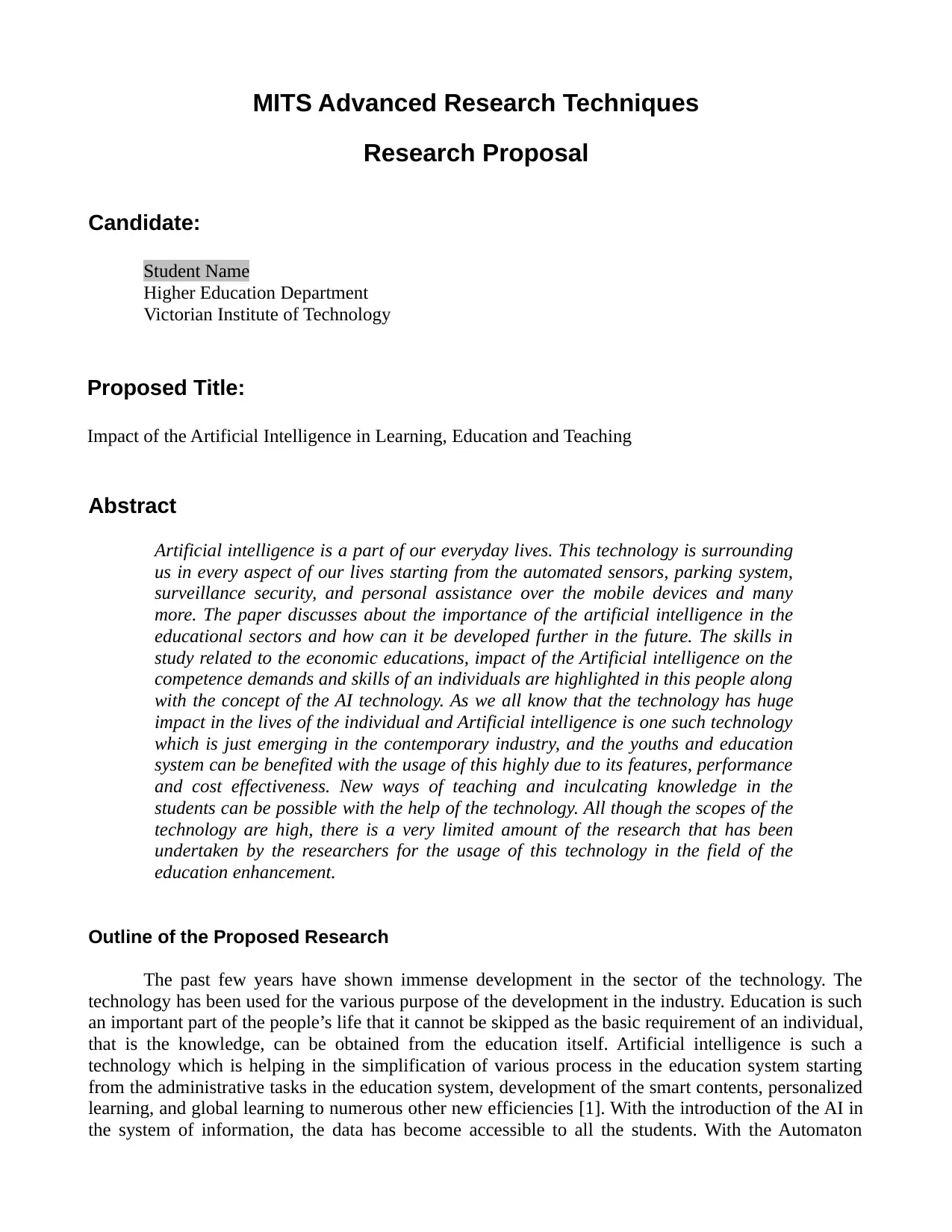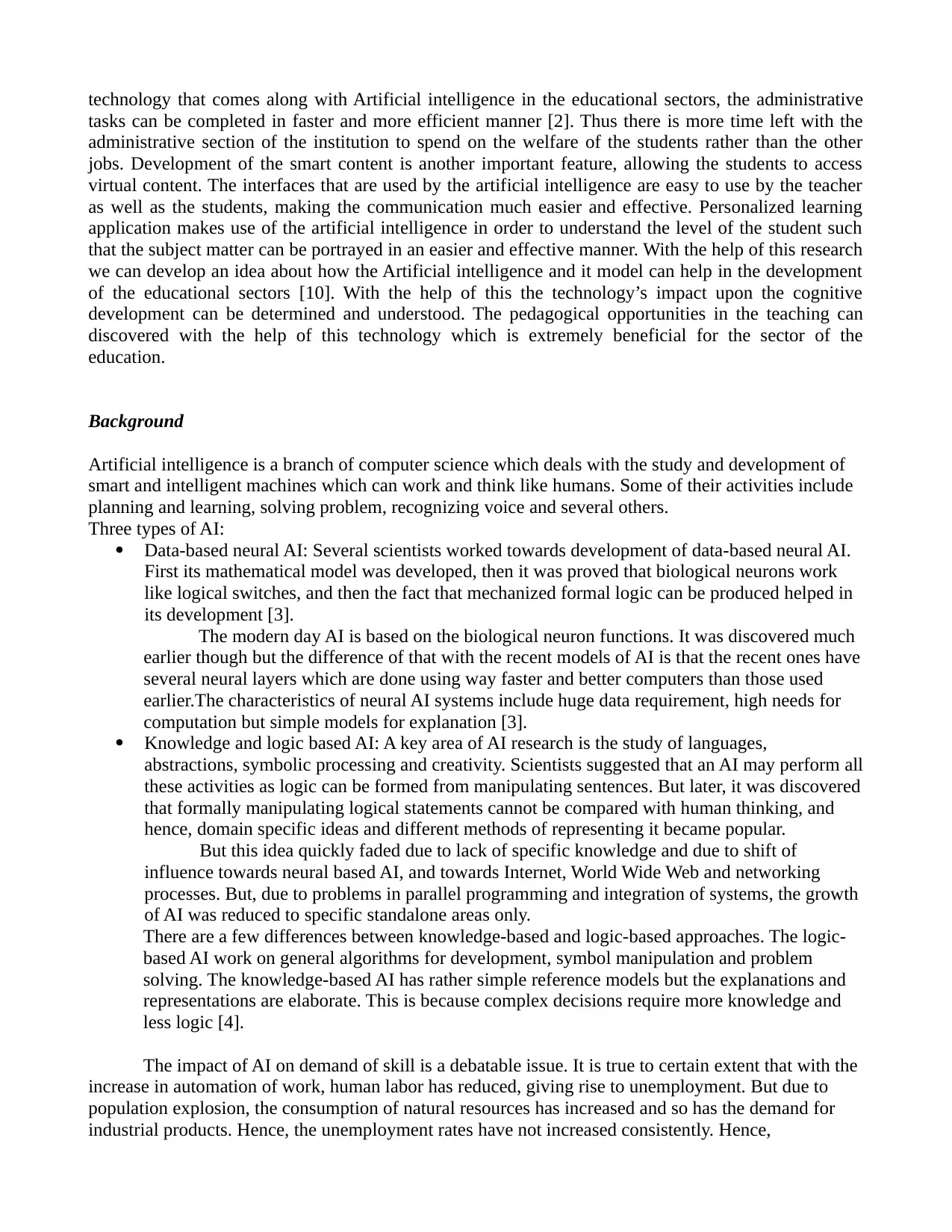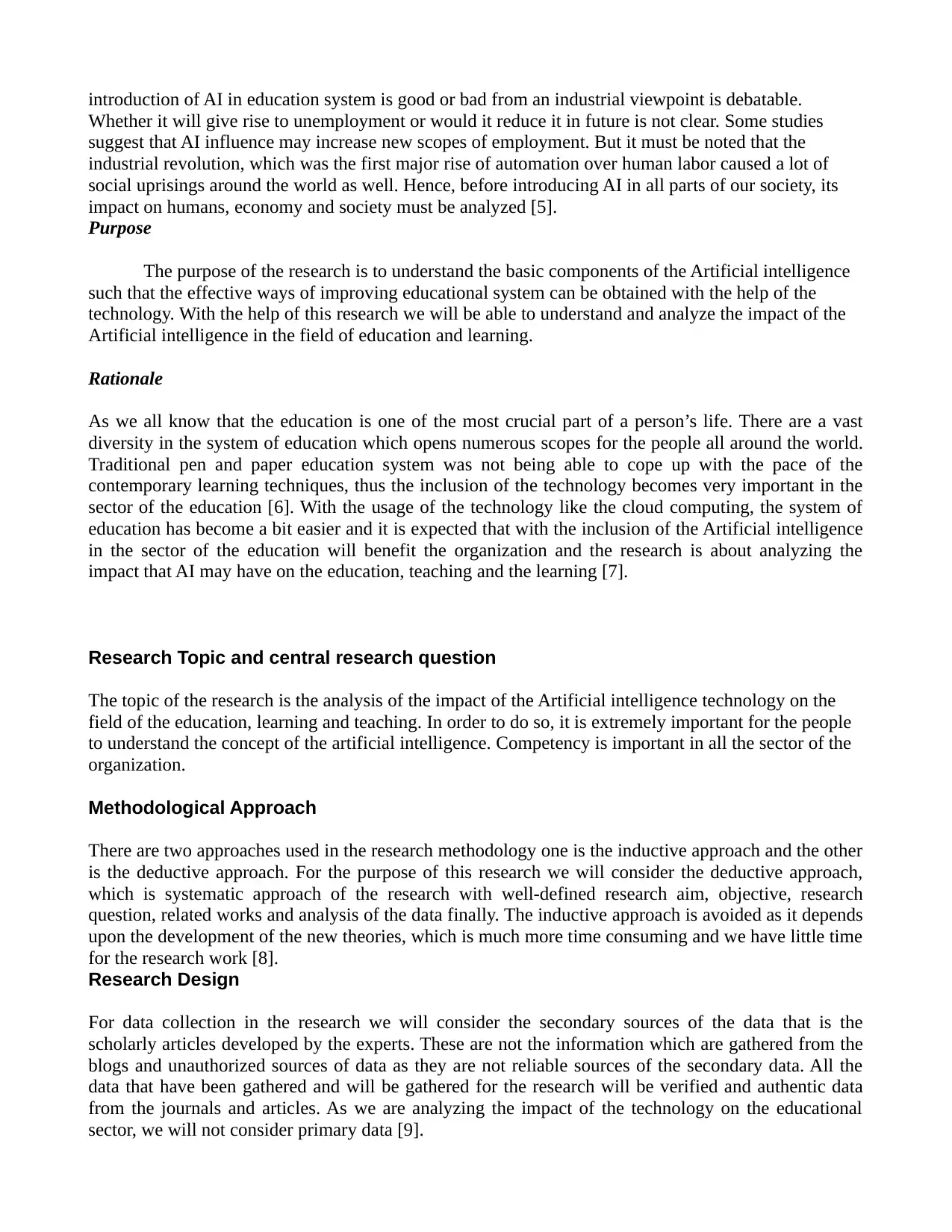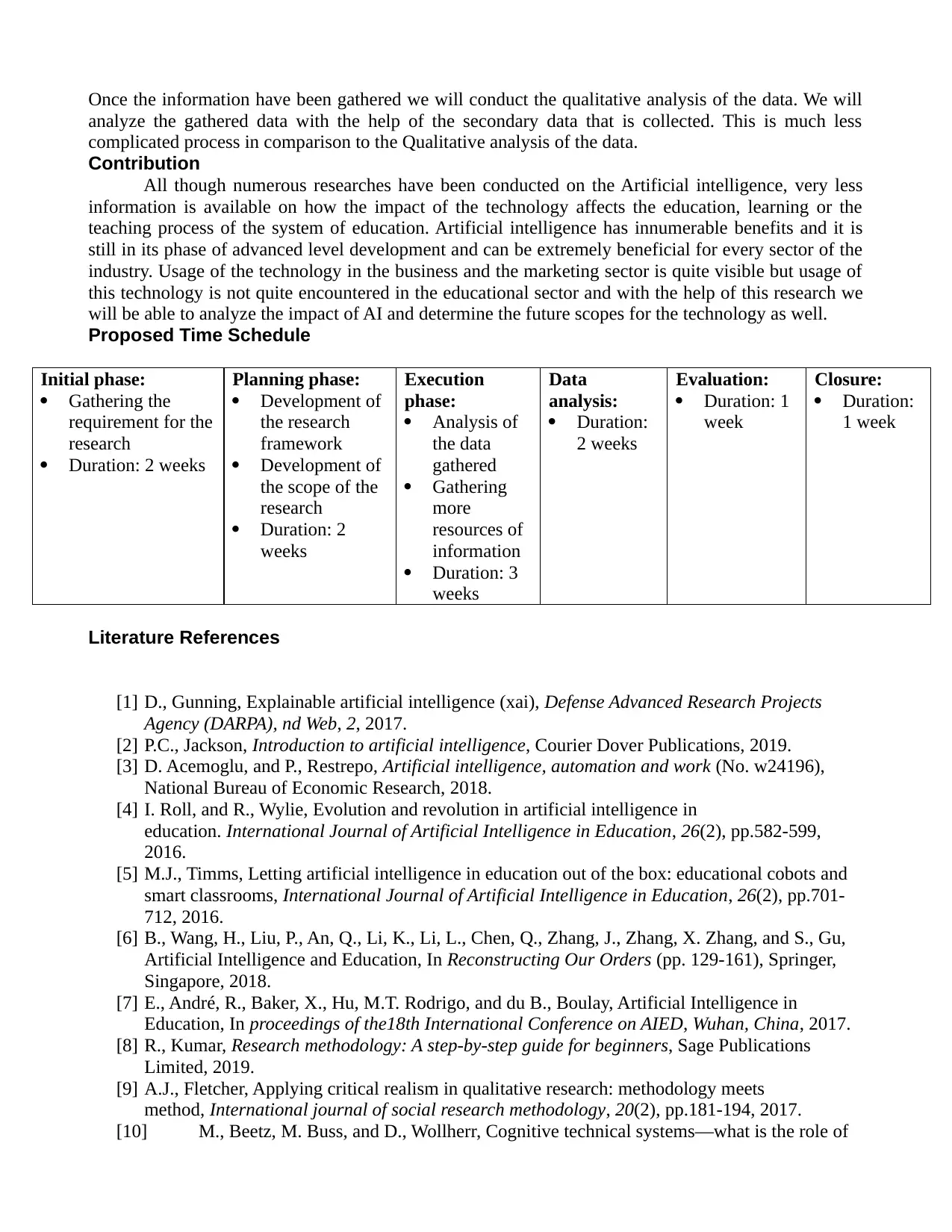Impact of the Artificial Intelligence
VerifiedAdded on 2022/09/12
|5
|2299
|10
AI Summary
Contribute Materials
Your contribution can guide someone’s learning journey. Share your
documents today.

MITS Advanced Research Techniques
Research Proposal
Candidate:
Student Name
Higher Education Department
Victorian Institute of Technology
Proposed Title:
Impact of the Artificial Intelligence in Learning, Education and Teaching
Abstract
Artificial intelligence is a part of our everyday lives. This technology is surrounding
us in every aspect of our lives starting from the automated sensors, parking system,
surveillance security, and personal assistance over the mobile devices and many
more. The paper discusses about the importance of the artificial intelligence in the
educational sectors and how can it be developed further in the future. The skills in
study related to the economic educations, impact of the Artificial intelligence on the
competence demands and skills of an individuals are highlighted in this people along
with the concept of the AI technology. As we all know that the technology has huge
impact in the lives of the individual and Artificial intelligence is one such technology
which is just emerging in the contemporary industry, and the youths and education
system can be benefited with the usage of this highly due to its features, performance
and cost effectiveness. New ways of teaching and inculcating knowledge in the
students can be possible with the help of the technology. All though the scopes of the
technology are high, there is a very limited amount of the research that has been
undertaken by the researchers for the usage of this technology in the field of the
education enhancement.
Outline of the Proposed Research
The past few years have shown immense development in the sector of the technology. The
technology has been used for the various purpose of the development in the industry. Education is such
an important part of the people’s life that it cannot be skipped as the basic requirement of an individual,
that is the knowledge, can be obtained from the education itself. Artificial intelligence is such a
technology which is helping in the simplification of various process in the education system starting
from the administrative tasks in the education system, development of the smart contents, personalized
learning, and global learning to numerous other new efficiencies [1]. With the introduction of the AI in
the system of information, the data has become accessible to all the students. With the Automaton
Research Proposal
Candidate:
Student Name
Higher Education Department
Victorian Institute of Technology
Proposed Title:
Impact of the Artificial Intelligence in Learning, Education and Teaching
Abstract
Artificial intelligence is a part of our everyday lives. This technology is surrounding
us in every aspect of our lives starting from the automated sensors, parking system,
surveillance security, and personal assistance over the mobile devices and many
more. The paper discusses about the importance of the artificial intelligence in the
educational sectors and how can it be developed further in the future. The skills in
study related to the economic educations, impact of the Artificial intelligence on the
competence demands and skills of an individuals are highlighted in this people along
with the concept of the AI technology. As we all know that the technology has huge
impact in the lives of the individual and Artificial intelligence is one such technology
which is just emerging in the contemporary industry, and the youths and education
system can be benefited with the usage of this highly due to its features, performance
and cost effectiveness. New ways of teaching and inculcating knowledge in the
students can be possible with the help of the technology. All though the scopes of the
technology are high, there is a very limited amount of the research that has been
undertaken by the researchers for the usage of this technology in the field of the
education enhancement.
Outline of the Proposed Research
The past few years have shown immense development in the sector of the technology. The
technology has been used for the various purpose of the development in the industry. Education is such
an important part of the people’s life that it cannot be skipped as the basic requirement of an individual,
that is the knowledge, can be obtained from the education itself. Artificial intelligence is such a
technology which is helping in the simplification of various process in the education system starting
from the administrative tasks in the education system, development of the smart contents, personalized
learning, and global learning to numerous other new efficiencies [1]. With the introduction of the AI in
the system of information, the data has become accessible to all the students. With the Automaton
Secure Best Marks with AI Grader
Need help grading? Try our AI Grader for instant feedback on your assignments.

technology that comes along with Artificial intelligence in the educational sectors, the administrative
tasks can be completed in faster and more efficient manner [2]. Thus there is more time left with the
administrative section of the institution to spend on the welfare of the students rather than the other
jobs. Development of the smart content is another important feature, allowing the students to access
virtual content. The interfaces that are used by the artificial intelligence are easy to use by the teacher
as well as the students, making the communication much easier and effective. Personalized learning
application makes use of the artificial intelligence in order to understand the level of the student such
that the subject matter can be portrayed in an easier and effective manner. With the help of this research
we can develop an idea about how the Artificial intelligence and it model can help in the development
of the educational sectors [10]. With the help of this the technology’s impact upon the cognitive
development can be determined and understood. The pedagogical opportunities in the teaching can
discovered with the help of this technology which is extremely beneficial for the sector of the
education.
Background
Artificial intelligence is a branch of computer science which deals with the study and development of
smart and intelligent machines which can work and think like humans. Some of their activities include
planning and learning, solving problem, recognizing voice and several others.
Three types of AI:
Data-based neural AI: Several scientists worked towards development of data-based neural AI.
First its mathematical model was developed, then it was proved that biological neurons work
like logical switches, and then the fact that mechanized formal logic can be produced helped in
its development [3].
The modern day AI is based on the biological neuron functions. It was discovered much
earlier though but the difference of that with the recent models of AI is that the recent ones have
several neural layers which are done using way faster and better computers than those used
earlier.The characteristics of neural AI systems include huge data requirement, high needs for
computation but simple models for explanation [3].
Knowledge and logic based AI: A key area of AI research is the study of languages,
abstractions, symbolic processing and creativity. Scientists suggested that an AI may perform all
these activities as logic can be formed from manipulating sentences. But later, it was discovered
that formally manipulating logical statements cannot be compared with human thinking, and
hence, domain specific ideas and different methods of representing it became popular.
But this idea quickly faded due to lack of specific knowledge and due to shift of
influence towards neural based AI, and towards Internet, World Wide Web and networking
processes. But, due to problems in parallel programming and integration of systems, the growth
of AI was reduced to specific standalone areas only.
There are a few differences between knowledge-based and logic-based approaches. The logic-
based AI work on general algorithms for development, symbol manipulation and problem
solving. The knowledge-based AI has rather simple reference models but the explanations and
representations are elaborate. This is because complex decisions require more knowledge and
less logic [4].
The impact of AI on demand of skill is a debatable issue. It is true to certain extent that with the
increase in automation of work, human labor has reduced, giving rise to unemployment. But due to
population explosion, the consumption of natural resources has increased and so has the demand for
industrial products. Hence, the unemployment rates have not increased consistently. Hence,
tasks can be completed in faster and more efficient manner [2]. Thus there is more time left with the
administrative section of the institution to spend on the welfare of the students rather than the other
jobs. Development of the smart content is another important feature, allowing the students to access
virtual content. The interfaces that are used by the artificial intelligence are easy to use by the teacher
as well as the students, making the communication much easier and effective. Personalized learning
application makes use of the artificial intelligence in order to understand the level of the student such
that the subject matter can be portrayed in an easier and effective manner. With the help of this research
we can develop an idea about how the Artificial intelligence and it model can help in the development
of the educational sectors [10]. With the help of this the technology’s impact upon the cognitive
development can be determined and understood. The pedagogical opportunities in the teaching can
discovered with the help of this technology which is extremely beneficial for the sector of the
education.
Background
Artificial intelligence is a branch of computer science which deals with the study and development of
smart and intelligent machines which can work and think like humans. Some of their activities include
planning and learning, solving problem, recognizing voice and several others.
Three types of AI:
Data-based neural AI: Several scientists worked towards development of data-based neural AI.
First its mathematical model was developed, then it was proved that biological neurons work
like logical switches, and then the fact that mechanized formal logic can be produced helped in
its development [3].
The modern day AI is based on the biological neuron functions. It was discovered much
earlier though but the difference of that with the recent models of AI is that the recent ones have
several neural layers which are done using way faster and better computers than those used
earlier.The characteristics of neural AI systems include huge data requirement, high needs for
computation but simple models for explanation [3].
Knowledge and logic based AI: A key area of AI research is the study of languages,
abstractions, symbolic processing and creativity. Scientists suggested that an AI may perform all
these activities as logic can be formed from manipulating sentences. But later, it was discovered
that formally manipulating logical statements cannot be compared with human thinking, and
hence, domain specific ideas and different methods of representing it became popular.
But this idea quickly faded due to lack of specific knowledge and due to shift of
influence towards neural based AI, and towards Internet, World Wide Web and networking
processes. But, due to problems in parallel programming and integration of systems, the growth
of AI was reduced to specific standalone areas only.
There are a few differences between knowledge-based and logic-based approaches. The logic-
based AI work on general algorithms for development, symbol manipulation and problem
solving. The knowledge-based AI has rather simple reference models but the explanations and
representations are elaborate. This is because complex decisions require more knowledge and
less logic [4].
The impact of AI on demand of skill is a debatable issue. It is true to certain extent that with the
increase in automation of work, human labor has reduced, giving rise to unemployment. But due to
population explosion, the consumption of natural resources has increased and so has the demand for
industrial products. Hence, the unemployment rates have not increased consistently. Hence,

introduction of AI in education system is good or bad from an industrial viewpoint is debatable.
Whether it will give rise to unemployment or would it reduce it in future is not clear. Some studies
suggest that AI influence may increase new scopes of employment. But it must be noted that the
industrial revolution, which was the first major rise of automation over human labor caused a lot of
social uprisings around the world as well. Hence, before introducing AI in all parts of our society, its
impact on humans, economy and society must be analyzed [5].
Purpose
The purpose of the research is to understand the basic components of the Artificial intelligence
such that the effective ways of improving educational system can be obtained with the help of the
technology. With the help of this research we will be able to understand and analyze the impact of the
Artificial intelligence in the field of education and learning.
Rationale
As we all know that the education is one of the most crucial part of a person’s life. There are a vast
diversity in the system of education which opens numerous scopes for the people all around the world.
Traditional pen and paper education system was not being able to cope up with the pace of the
contemporary learning techniques, thus the inclusion of the technology becomes very important in the
sector of the education [6]. With the usage of the technology like the cloud computing, the system of
education has become a bit easier and it is expected that with the inclusion of the Artificial intelligence
in the sector of the education will benefit the organization and the research is about analyzing the
impact that AI may have on the education, teaching and the learning [7].
Research Topic and central research question
The topic of the research is the analysis of the impact of the Artificial intelligence technology on the
field of the education, learning and teaching. In order to do so, it is extremely important for the people
to understand the concept of the artificial intelligence. Competency is important in all the sector of the
organization.
Methodological Approach
There are two approaches used in the research methodology one is the inductive approach and the other
is the deductive approach. For the purpose of this research we will consider the deductive approach,
which is systematic approach of the research with well-defined research aim, objective, research
question, related works and analysis of the data finally. The inductive approach is avoided as it depends
upon the development of the new theories, which is much more time consuming and we have little time
for the research work [8].
Research Design
For data collection in the research we will consider the secondary sources of the data that is the
scholarly articles developed by the experts. These are not the information which are gathered from the
blogs and unauthorized sources of data as they are not reliable sources of the secondary data. All the
data that have been gathered and will be gathered for the research will be verified and authentic data
from the journals and articles. As we are analyzing the impact of the technology on the educational
sector, we will not consider primary data [9].
Whether it will give rise to unemployment or would it reduce it in future is not clear. Some studies
suggest that AI influence may increase new scopes of employment. But it must be noted that the
industrial revolution, which was the first major rise of automation over human labor caused a lot of
social uprisings around the world as well. Hence, before introducing AI in all parts of our society, its
impact on humans, economy and society must be analyzed [5].
Purpose
The purpose of the research is to understand the basic components of the Artificial intelligence
such that the effective ways of improving educational system can be obtained with the help of the
technology. With the help of this research we will be able to understand and analyze the impact of the
Artificial intelligence in the field of education and learning.
Rationale
As we all know that the education is one of the most crucial part of a person’s life. There are a vast
diversity in the system of education which opens numerous scopes for the people all around the world.
Traditional pen and paper education system was not being able to cope up with the pace of the
contemporary learning techniques, thus the inclusion of the technology becomes very important in the
sector of the education [6]. With the usage of the technology like the cloud computing, the system of
education has become a bit easier and it is expected that with the inclusion of the Artificial intelligence
in the sector of the education will benefit the organization and the research is about analyzing the
impact that AI may have on the education, teaching and the learning [7].
Research Topic and central research question
The topic of the research is the analysis of the impact of the Artificial intelligence technology on the
field of the education, learning and teaching. In order to do so, it is extremely important for the people
to understand the concept of the artificial intelligence. Competency is important in all the sector of the
organization.
Methodological Approach
There are two approaches used in the research methodology one is the inductive approach and the other
is the deductive approach. For the purpose of this research we will consider the deductive approach,
which is systematic approach of the research with well-defined research aim, objective, research
question, related works and analysis of the data finally. The inductive approach is avoided as it depends
upon the development of the new theories, which is much more time consuming and we have little time
for the research work [8].
Research Design
For data collection in the research we will consider the secondary sources of the data that is the
scholarly articles developed by the experts. These are not the information which are gathered from the
blogs and unauthorized sources of data as they are not reliable sources of the secondary data. All the
data that have been gathered and will be gathered for the research will be verified and authentic data
from the journals and articles. As we are analyzing the impact of the technology on the educational
sector, we will not consider primary data [9].

Once the information have been gathered we will conduct the qualitative analysis of the data. We will
analyze the gathered data with the help of the secondary data that is collected. This is much less
complicated process in comparison to the Qualitative analysis of the data.
Contribution
All though numerous researches have been conducted on the Artificial intelligence, very less
information is available on how the impact of the technology affects the education, learning or the
teaching process of the system of education. Artificial intelligence has innumerable benefits and it is
still in its phase of advanced level development and can be extremely beneficial for every sector of the
industry. Usage of the technology in the business and the marketing sector is quite visible but usage of
this technology is not quite encountered in the educational sector and with the help of this research we
will be able to analyze the impact of AI and determine the future scopes for the technology as well.
Proposed Time Schedule
Initial phase:
Gathering the
requirement for the
research
Duration: 2 weeks
Planning phase:
Development of
the research
framework
Development of
the scope of the
research
Duration: 2
weeks
Execution
phase:
Analysis of
the data
gathered
Gathering
more
resources of
information
Duration: 3
weeks
Data
analysis:
Duration:
2 weeks
Evaluation:
Duration: 1
week
Closure:
Duration:
1 week
Literature References
[1] D., Gunning, Explainable artificial intelligence (xai), Defense Advanced Research Projects
Agency (DARPA), nd Web, 2, 2017.
[2] P.C., Jackson, Introduction to artificial intelligence, Courier Dover Publications, 2019.
[3] D. Acemoglu, and P., Restrepo, Artificial intelligence, automation and work (No. w24196),
National Bureau of Economic Research, 2018.
[4] I. Roll, and R., Wylie, Evolution and revolution in artificial intelligence in
education. International Journal of Artificial Intelligence in Education, 26(2), pp.582-599,
2016.
[5] M.J., Timms, Letting artificial intelligence in education out of the box: educational cobots and
smart classrooms, International Journal of Artificial Intelligence in Education, 26(2), pp.701-
712, 2016.
[6] B., Wang, H., Liu, P., An, Q., Li, K., Li, L., Chen, Q., Zhang, J., Zhang, X. Zhang, and S., Gu,
Artificial Intelligence and Education, In Reconstructing Our Orders (pp. 129-161), Springer,
Singapore, 2018.
[7] E., André, R., Baker, X., Hu, M.T. Rodrigo, and du B., Boulay, Artificial Intelligence in
Education, In proceedings of the18th International Conference on AIED, Wuhan, China, 2017.
[8] R., Kumar, Research methodology: A step-by-step guide for beginners, Sage Publications
Limited, 2019.
[9] A.J., Fletcher, Applying critical realism in qualitative research: methodology meets
method, International journal of social research methodology, 20(2), pp.181-194, 2017.
[10] M., Beetz, M. Buss, and D., Wollherr, Cognitive technical systems—what is the role of
analyze the gathered data with the help of the secondary data that is collected. This is much less
complicated process in comparison to the Qualitative analysis of the data.
Contribution
All though numerous researches have been conducted on the Artificial intelligence, very less
information is available on how the impact of the technology affects the education, learning or the
teaching process of the system of education. Artificial intelligence has innumerable benefits and it is
still in its phase of advanced level development and can be extremely beneficial for every sector of the
industry. Usage of the technology in the business and the marketing sector is quite visible but usage of
this technology is not quite encountered in the educational sector and with the help of this research we
will be able to analyze the impact of AI and determine the future scopes for the technology as well.
Proposed Time Schedule
Initial phase:
Gathering the
requirement for the
research
Duration: 2 weeks
Planning phase:
Development of
the research
framework
Development of
the scope of the
research
Duration: 2
weeks
Execution
phase:
Analysis of
the data
gathered
Gathering
more
resources of
information
Duration: 3
weeks
Data
analysis:
Duration:
2 weeks
Evaluation:
Duration: 1
week
Closure:
Duration:
1 week
Literature References
[1] D., Gunning, Explainable artificial intelligence (xai), Defense Advanced Research Projects
Agency (DARPA), nd Web, 2, 2017.
[2] P.C., Jackson, Introduction to artificial intelligence, Courier Dover Publications, 2019.
[3] D. Acemoglu, and P., Restrepo, Artificial intelligence, automation and work (No. w24196),
National Bureau of Economic Research, 2018.
[4] I. Roll, and R., Wylie, Evolution and revolution in artificial intelligence in
education. International Journal of Artificial Intelligence in Education, 26(2), pp.582-599,
2016.
[5] M.J., Timms, Letting artificial intelligence in education out of the box: educational cobots and
smart classrooms, International Journal of Artificial Intelligence in Education, 26(2), pp.701-
712, 2016.
[6] B., Wang, H., Liu, P., An, Q., Li, K., Li, L., Chen, Q., Zhang, J., Zhang, X. Zhang, and S., Gu,
Artificial Intelligence and Education, In Reconstructing Our Orders (pp. 129-161), Springer,
Singapore, 2018.
[7] E., André, R., Baker, X., Hu, M.T. Rodrigo, and du B., Boulay, Artificial Intelligence in
Education, In proceedings of the18th International Conference on AIED, Wuhan, China, 2017.
[8] R., Kumar, Research methodology: A step-by-step guide for beginners, Sage Publications
Limited, 2019.
[9] A.J., Fletcher, Applying critical realism in qualitative research: methodology meets
method, International journal of social research methodology, 20(2), pp.181-194, 2017.
[10] M., Beetz, M. Buss, and D., Wollherr, Cognitive technical systems—what is the role of
Secure Best Marks with AI Grader
Need help grading? Try our AI Grader for instant feedback on your assignments.

artificial intelligence?, In Annual Conference on Artificial Intelligence (pp. 19-42), Springer,
Berlin, Heidelberg, 2007, September.
Berlin, Heidelberg, 2007, September.
1 out of 5
Related Documents
Your All-in-One AI-Powered Toolkit for Academic Success.
+13062052269
info@desklib.com
Available 24*7 on WhatsApp / Email
![[object Object]](/_next/static/media/star-bottom.7253800d.svg)
Unlock your academic potential
© 2024 | Zucol Services PVT LTD | All rights reserved.





